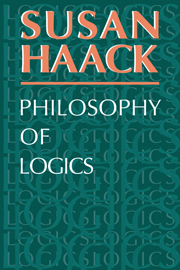Book contents
- Frontmatter
- ACKNOWLEDGMENTS
- Contents
- Preface
- Notation and abbreviation
- 1 ‘Philosophy of logics’
- 2 Validity
- 3 Sentence connectives
- 4 Quantifiers
- 5 Singular terms
- 6 Sentences, statements, propositions
- 7 Theories of truth
- 8 Paradoxes
- 9 Logic and logics
- 10 Modal logic
- 11 Many-valued logic
- 12 Some metaphysical and epistemological questions about logic
- Glossary
- Advice on reading
- Bibliography
- Index
9 - Logic and logics
Published online by Cambridge University Press: 05 June 2012
- Frontmatter
- ACKNOWLEDGMENTS
- Contents
- Preface
- Notation and abbreviation
- 1 ‘Philosophy of logics’
- 2 Validity
- 3 Sentence connectives
- 4 Quantifiers
- 5 Singular terms
- 6 Sentences, statements, propositions
- 7 Theories of truth
- 8 Paradoxes
- 9 Logic and logics
- 10 Modal logic
- 11 Many-valued logic
- 12 Some metaphysical and epistemological questions about logic
- Glossary
- Advice on reading
- Bibliography
- Index
Summary
…since one never knows what will be the line of advance, it is always most rash to condemn what is not quite in the fashion of the moment.
Russell 1906, cited in Rescher 1974‘Classical’ and ‘non-classical’ logics
There are a great many formal logical systems. In fact, ever since the ‘classical’ logical apparatus was formulated, there have been those who urged that it should be improved, modified or replaced. An instructive example can be taken from the history of the material conditional; anticipated by the Stoics, ‘material implication’ was formalised by Frege 1879 and Russell and Whitehead 1910 and supplied with a suitable semantics by Post 1921 and Wittgenstein 1922. As early as 1880, however, MacColl had urged the claims of a stricter conditional; ‘strict implication’ was formalised by Lewis 1918; and after that dissatisfaction with its claims to represent entailment led to the introduction of ‘relevant implication’ (see ch. 10 §7).
My present object is to get some perspective on the great variety of logical systems, to approach such questions as how they relate to each other, whether one must choose between them, and, if so, how. My strategy will be to consider the various ways in which the standard logical apparatus has been modified, and the various pressures in response to which such modifications have been made.
Information
- Type
- Chapter
- Information
- Philosophy of Logics , pp. 152 - 169Publisher: Cambridge University PressPrint publication year: 1978
